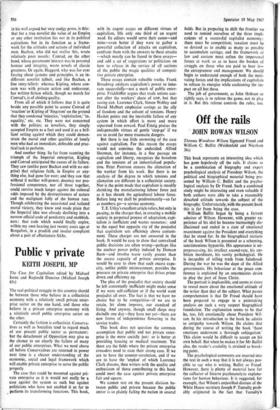Public v private
KEITH JOSEPH, MP
The Case for Capitalism edited by Michael Ivens and Reginald Dunstan (Michael Joseph 63s)
The real political struggle in this country should be between those who believe in a collectivist economy with a relatively small private enter- prise sector on the one hand, and those who believe in a private enterprise economy with a relatively small public enterprise sector on the other.
Certainly the fashion is collectivist. Conserva- tives as well as Socialists tend to regard much of our present public sector as permanent: but the detachment of Opposition may give us the chance to see clearly the failure of many of our public enterprises. What we need above all before Conservatives are returned to power next time is a clearer understanding of the economic, social and legal framework which will enable private enterprise to serve the public properly.
The case that could be mounted against pri- vate enterprise as it is would not really be a case against the system as such but against politicians who have not enabled it so far to perform its transforming functions. This book, with its cogent essays on different virtues of capitalism, fills only one third of an urgent need. Its editors would serve their cause—and mine—even better if they were to gather a powerful collection of attacks on capitalism,
confront them with the answers to these attacks —which mostly can be found in these essays— and add a set of suggestions to-politicians on how to release in the service of all sections of the public the magic qualities of competi- tive private enterprise.
These essays contain valuable truths. Frank Broadway analyses capitalism's power to inno- vate successfully—not a mark of public enter-
prise. Frickhoffer argues that trade unions can- not alter the workers' share of GNP, but that
saving can. Laurence Clark, Simon Webley and David Malbert emphasise savings as the ally of freedom and the solvent of tensions. Henry Haslett points out the inevitable failure of any system in which effort is more and more separated from reward. Paul Einzig praises the indispensable virtues of gentle `stop-go' if we are to avoid far more traumatic dangers.
But there is too little answering of the case against capitalism. For this reason the essays would not convince the undecided. Alfred Sherman, for instance, in a fine passage on capitalism and liberty, recognises the boredom and the tensions of an industrialised popula- tion. Peter Paterson stresses the alienation of the worker from his work. But there is no analysis of the degree to which tensions and alienation are different in a collectivist society. Nor is the point made that capitalism is steadily shrinking the manufacturing labour force just as it has shrunk the agricultural labour force. Before long we shall be predominantly—so far as numbers go—a service economy.
T. E. Utley's excellent article refers, but only in passing, to the charges that, in creating a mobile society in perpetual process of adaptation, capi- talism is inefficient and wastes resources : and to the equal but opposite cry of the poujadist that capitalism sets efficiency above content- ment. These charges are not answered in the book. It would be easy to show that centralised public decisions are often wrong—perhaps like the nuclear power policy indicted by Duncan Burn—and involve waste vastly greater than the excess capacity of private enterprise. It would be easy to show that such excess capa- city, unlike public misinvestment, provides the pressure on private enterprise that drives prices down and efficiency up.
The plea of the poujadist that society should be left contentedly inefficient might make sense if we were self-sufficient or if the world went poujadist all over. The fact is that we have no choice but to be competitive—if we are to retain, let alone improve, our standard of living. And anyway, though small shops may dwindle one day—they have not yet—there are new forms of independence flowering in the service trades.
This book does not question the common assumption that public and not private enter- prise is the more socially just: or is better at providing housing or medical treatment. Yet these are the fields where the private enterprise crusaders need to state their strong case. If we are to have the counter-revolution, and if we are to have the 'unplan' of which Laurence Clark dreams, then writers with the quality and enthusiasm of those contributing to this book could meet the case against private enterprise fair and square.
We cannot rest on the present division be- tween public and private because the public sector is so plainly failing the nation in several fields. But in preparing to shift the frontier ‘%e need to remind ourselves of the three impli- cations of a successful capitalist economy: there must be competition; taxation must be so devised as to enable as many as- possible to accumulate savings; and the framework of law and custom must soften the impersonal forces at work so as to leave the burden of struggle on those who are paid to bear it— the entrepreneur and management. We should begin to understand enough of both the moti- vating forces and the implications of capitalism to release its energies while cushioning the im- pact on all but these.
The job of government, as John Hobson so rightly says, is to referee the game, not to play in it. But this referee controls the rules, too.


































 Previous page
Previous page